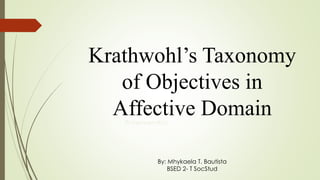
Krathwohl's Taxonomy of Affective Domain
- 1. Krathwohl’s Taxonomy of Objectives in Affective Domain© menuemitch By: Mhykaela T. Bautista BSED 2- T SocStud
- 2. David Reading Krathwohl © menuemitch
- 3. David Reading Krathwohl (born May 14, 1921) is an American educational psychologist who has served education in a multitude of settings: he was the director of the Bureau of Educational Research at Michigan State University and was also a past president of the American Educational Research Association where he served in multiple capacities, as a member of the research advisory committee for the Bureau of Research of the USOE and as regional chairman of the board of trusties of the Eastern Regional Institute for Education. While studying with Benjamin Bloom, he co-authored the Taxonomy of Educational Objectives, (also known as Bloom's Taxonomy) a critical publication on education and has also edited, authored and co-authored several books in regards to education. He received the Hannah Hammond Professor of Education Emeritus at Syracuse University and has made significant contributions to the field of educational psychology. © menuemitch
- 4. Learning Taxonomy- Krathwohl’s Affective Domain © menuemitch
- 6. Demonstrated by behaviors indicating attitudes of awareness, interest, attention, concern, and responsibility, ability to listen and respond in interactions with others, and ability to demonstrate those attitudinal characteristics or values which are appropriate to the test situation and the field of study. © menuemitch
- 8. It refers to the student's willingness to attend to particular phenomena of stimuli (classroom activities, textbook, music, etc.). Learning outcomes in this area range from the simple awareness that a thing exists to selective attention on the part of the learner. Receiving represents the lowest level of learning outcomes in the affective domain. © menuemitch
- 9. Examples: Listening to discussions of controversial issues with an open mind. Respecting the rights of others. Listen for and remember the name of newly introduced people. © menuemitch
- 11. Refers to active participation on the part of the student. At this level he or she not only attends to a particular phenomenon but also reacts to it in some way. Learning outcomes in this area may emphasize acquiescence in responding (reads assigned material), willingness to respond (voluntarily reads beyond assignment), or satisfaction in responding (reads for pleasure or enjoyment). The higher levels of this category include those instructional objectives that are commonly classified under “interest”; that is, those that stress the seeking out and enjoyment of particular activities. © menuemitch
- 12. Examples: Completing homework assignments. Participating in team problem solving activities. Questions new ideals, concepts, models, etc. in order to fully understand them. © menuemitch
- 14. It is concerned with the worth or value a student attaches to a particular object, phenomenon, or behaviour. This ranges in degree from the simpler acceptance of a value (desires to improve group skills) to the more complex level of commitment (assumes responsibility for the effective functioning of the group). Valuing is based on the internalization of a set of specified values, but clues to these values are expressed in the student's overt behavior. Learning outcomes in this area are concerned with behavior that is consistent and stable enough to make the value clearly identifiable. Instructional objectives that are commonly classified under “attitudes” and “appreciation” would fall into this category. © menuemitch
- 15. Examples: Accepting the idea that integrated curricula is a good way to learn. Participating in a campus blood drive. Demonstrates belief in the democratic process. Shows the ability to solve problems. Informs management on matters that one feels strongly about.
- 17. It is concerned with bringing together different values, resolving conflicts between them, and beginning the building of an internally consistent value system. Thus the emphasis is on comparing, relating, and synthesizing values. Learning outcomes may be concerned with the conceptualization of a value (recognizes the responsibility of each individual for improving human relations) or with the organization of a value system (develops a vocational plan that satisfies his or her need for both economic security and social service). Instructional objectives relating to the development of a philosophy of life would fall into this category. © menuemitch
- 18. Examples: Recognizing own abilities, limitations, and values and developing realistic aspirations. Accepts responsibility fro one’s behaviour. Explains the role of systematic planning in solving problems. Accepts professional ethical standards. Prioritizes time effectively to meet the needs of the organization, family, and self. © menuemitch
- 19. Characterization by a value or value set © menuemitch
- 20. The individual has a value system that has controlled his or her behaviour for a sufficiently long time for him or her to develop a characteristic “life-style.” Thus the behaviour is pervasive, consistent, and predictable. Learning outcomes at this level cover a broad range of activities, but the major emphasis is on the fact that the behaviour is typical or characteristic of the student. Instructional objectives that are concerned with the student's general patterns of adjustment (personal, social, emotional) would be appropriate here. © menuemitch
- 21. Examples: A person's lifestyle influences reactions to many different kinds of situations. Shows self-reliance when working independently. Uses an objective approach in problem solving. Displays a professional commitment to ethical practice on a daily basis. Revises judgments and changes behaviour in light of new evidence. © menuemitch
